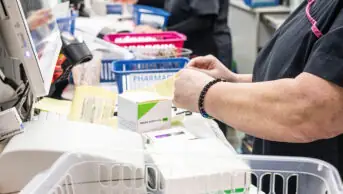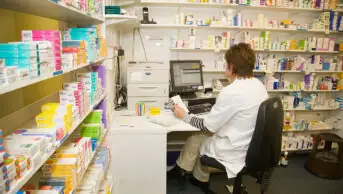
Imagedoc / Alamy Stock Photo
Health Education England (HEE) has tendered a contract for a provider to train 500 community pharmacists to become designated prescribing practitioners (DPPs).
The contract, worth £500,000, will require the 500 pharmacists to be enrolled on the training course by the end of March 2024.
This comes after pharmacists warned of a shortage of DPPs, partly because the majority of roles are unpaid, making it difficult to justify taking the position.
A DPP supervises trainee independent prescribers (IPs) during the hands-on, or ‘experiential learning’, part of their training.
DPPs can be pharmacists, doctors, nurses or dentists, and they must already be an IP themselves, with at least three years’ prescribing experience.
The demand for DPPs is set to increase, following a push by NHS England to ensure that community pharmacists in the workforce have the option to train as IPs. In February 2023, NHS England announced another 3,000 funded IP training places would be available for pharmacists in England from April 2023.
According to HEE’s contract notice, published on 29 March 2023, it is looking for a “provider(s) to develop and deliver training to pharmacy staff (pharmacist and pharmacy technicians), across England, from community pharmacy backgrounds, to ensure that Designated Supervisors (DS) and DPPs are trained, competent and confident to provide support”.
A specification document for the training contract adds that the provider should offer fast-track options to recognise prior learning and to avoid duplication, and that the training should be “flexible to accommodate the work schedules of healthcare professions”.
Designated supervisors will be able to support training of pharmacy technicians as well as pharmacists.
“Building effective supervision for pharmacy technicians is fundamental to underpin the transformation and up-skilling of a growing pharmacy technician workforce,” the specification document said.
“This will enable appropriate skill-mix to support the required infrastructure changes, new and extended roles, and enhance the role of pharmacist clinicians and services across the sectors.”
Graham Stretch, chief pharmacist at Argyle Health Group and clinical director at Brentworth Primary Care Network, welcomed the contract, adding that “it’s good news that they’ve made an investment in training up more DPPs because I think, often, it’s a confidence issue”.
“My question would be, how many people are there who have been prescribing in the community for three years? Are there sufficient numbers of them out there prescribing?” he said.
“If you look at the framework from the Royal Pharmaceutical Society around being a DPP, it specifically says that you’ve got to be actively prescribing as part of your day-to-day business; it’s not just having three years’ worth of annotation. If there are sufficient [pharmacists] then that would provide a meaningful contribution to training capacity for community pharmacy.
“Moreover, if you only do it within community pharmacy and don’t provide a multidisciplinary approach to that training — and I’m quite sure that good DPPs would endeavour to do that with their local surgeries, hospitals, clinics — then my concern is you aren’t training people broadly enough,” he added.


